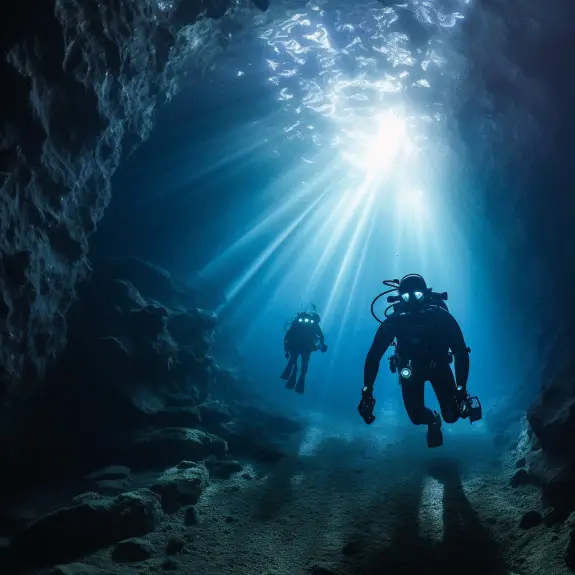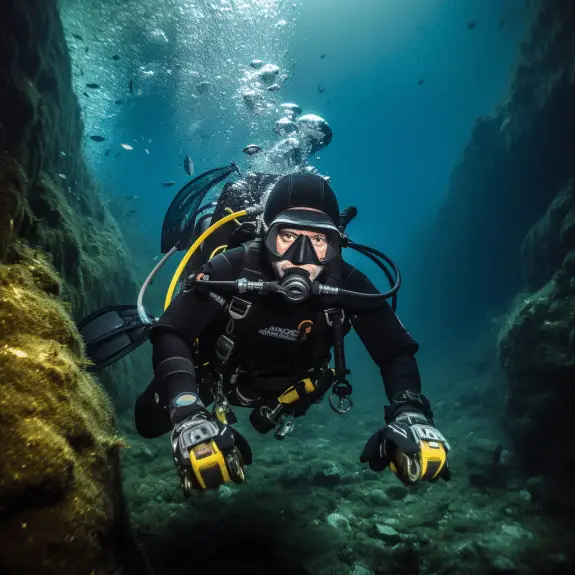Scuba Diving Safety and Limits As a professional scuba diver, I have been asked countless times, “how deep can you go?” Scuba diving is a thrilling and exhilarating experience, but it also comes with inherent risks, especially when venturing to deeper depths.
In this section, let’s explore how deep scuba diving can go. We will discuss the typical depths reached by recreational divers and the maximum depth allowed for safe and enjoyable diving experiences. So, buckle up and let’s dive in!

Key Takeaways:
- Scuba diving has a maximum depth limit for safety reasons.
- Recreational scuba diving usually reaches depths of around 40-60 feet.
- Deeper dives require advanced training and specialized equipment.
- Deep diving comes with increased risks and requires proper safety measures.
- Exploring deeper depths is an exciting and rewarding experience for experienced divers.
Exploring Underwater Depths: Scuba Diving Limits and Records
Scuba diving is a thrilling activity that allows us to explore the depths of our oceans and witness firsthand the incredible beauty and diversity of marine life. But just how deep can we go? Let’s take a closer look at the limits and records of scuba diving depths.
Deepest Scuba Dive Ever Recorded
The deepest scuba dive ever recorded is an astonishing 1,090 feet (332 meters) by Ahmed Gabr in 2014. Gabr, an Egyptian veteran diver and a former military instructor, broke the previous record set by South African Nuno Gomes in 2005.
“Diving is like meditation, it’s calming, it’s peaceful, it’s a great stress relief,” Gabr said. “But at the same time, it’s challenging, it’s dangerous, it requires quick thinking, planning, and teamwork.”
It’s worth mentioning that such extreme depths come with great risks, and divers should have extensive training and experience to attempt such records. The human body can only withstand so much pressure, and descending too deep can result in decompression sickness or other severe health problems.
Scuba Diving Records
Aside from the deepest scuba dive ever recorded, there are many impressive scuba diving records that showcase the incredible skills and bravery of divers. Here are just a few examples:
| Record | Diver | Depth | Date |
|---|---|---|---|
| Longest open saltwater scuba dive | Pradeep Kumar Chakraborty | 142 hours 42 minutes | May 2009 |
| Longest open freshwater scuba dive | Richard Presley | 48 hours | June 2016 |
| Fastest scuba dive ascent | Stig Severinsen | N/A | September 2010 |
Every scuba diving record is a testament to the determination, endurance, and skill of the divers who achieved them. Yet, it’s important to remember that these records require meticulous planning, practice, and, most importantly, strict adherence to scuba diving safety guidelines.
Scuba Divings Limits
When it comes to scuba diving, it’s essential to know your limits. Recreational divers, for instance, are typically limited to depths of 130 feet (40 meters), as going deeper requires specialized training and equipment.
Beyond recreational diving, there are several types of diving that allow for deeper exploration, including technical diving and commercial diving. However, these types of diving come with increased risks and require extensive training and certification.
It’s worth noting that even with all the proper training and equipment, there are limits to the depths that even the most experienced divers can safely reach. Deep-sea exploration is still a relatively new and highly challenging field, and there is still much to learn about the vast and uncharted depths of our oceans.
- In conclusion, while scuba diving offers us a glimpse into the hidden wonders of the underwater world, it’s crucial to remain aware of our limits and respect the immense power and mystery of the ocean. By doing so, we can continue to explore and appreciate the beauty and diversity of our planet’s oceans for generations to come.
Scuba Diving Safety and Rewards
As a professional scuba diver, I cannot emphasize enough the importance of scuba divings safety when it comes to exploring the deep-sea. While it can be a thrilling experience, it is crucial that divers take every precaution necessary to ensure their safety.
Taking Safety Precautions
The first step in ensuring scuba diving safety is to undergo proper training. It is important to learn the necessary skills and techniques for diving at different depths. Additionally, it is essential to follow guidelines provided by diving organizations and experienced divers, such as checking equipment before each dive, diving with a buddy, and using proper safety gear.
Another crucial aspect of scuba divings safety is knowing your limit. Diving to extreme depths can be dangerous, and divers must understand their own physical and mental abilities. Recognizing when to stop a dive, for example, when experiencing fatigue or discomfort, is important to avoid accidents.

The Rewards of Deep-Sea Exploration
Despite the risks involved, the rewards of deep-sea exploration are immeasurable. The thrill of discovering a new species or exploring a sunken ship is an unforgettable experience. Divers also get to witness the beauty and wonder of the underwater world in a way that few people have the opportunity to do.
Moreover, scuba diving can be a great way to connect with nature and have a positive impact on the environment. By exploring and documenting the sea, divers can aid in the conservation of marine life and influence others to do the same.
In conclusion, scuba diving safety is of utmost importance when it comes to deep-sea exploration. With proper training, safety gear, and knowing personal limits, divers can safely enjoy the incredible experiences that come with diving into the depths of our oceans. The rewards of exploring and conserving the underwater world are truly priceless.
FAQ
How deep can you go scuba diving?
The depths reached by scuba divers vary depending on their training and certification. Generally, recreational divers stick to depths of around 60-100 feet (18-30 meters). However, technical divers who undergo further training can explore depths of up to 300-400 feet (90-120 meters) or even deeper.
What is the maximum depth allowed for recreational diving?
The maximum depth allowed for recreational diving is typically set at 130 feet (40 meters). This depth is considered safe for divers with the appropriate training and experience. Going beyond this depth requires specialized training and equipment.
What is the deepest scuba dive ever recorded?
The current record for the deepest scuba dive stands at a staggering 1,090 feet (332 meters). This record was set by Ahmed Gabr in 2014 off the coast of Egypt. It’s important to note that this dive was part of a specialized technical dive conducted under controlled conditions.
Are there any limitations or safety considerations when diving to extreme depths?
Yes, diving to extreme depths comes with increased risks and considerations. The human body is not designed to withstand the pressures experienced at these depths, which can lead to decompression sickness and other serious health issues. Technical divers undergo extensive training and use specialized equipment to mitigate these risks.
How important is scuba diving safety?
Scuba diving safety is of paramount importance. Proper training, adherence to safety protocols, and regular equipment maintenance are essential for safe diving experiences. It is crucial to follow established guidelines, dive within your limits, and always dive with a buddy. Safety should never be compromised when exploring the depths of our oceans.
What are the rewards of deep-sea exploration through scuba diving?
Deep-sea exploration through scuba diving offers a unique opportunity to witness the incredible beauty and diversity of the underwater world. It provides adventurers with a sense of awe and wonder as they encounter fascinating marine life, explore captivating underwater landscapes, and uncover hidden treasures. The rewards of scuba diving go beyond the depths; they extend to personal growth, a greater appreciation for nature, and unforgettable memories.
